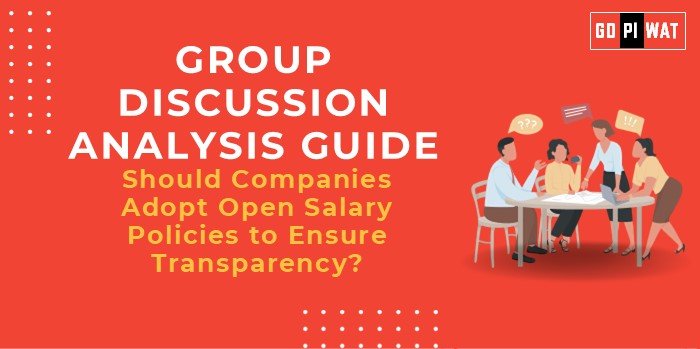💼 Should Companies Adopt Open Salary Policies to Ensure Transparency?
🌐 Introduction to Open Salary Policies
“In a rapidly evolving corporate landscape, open salary policies are emerging as a key strategy for fostering trust and transparency within organizations.”
Open salary policies, where employees know their peers’ earnings, are increasingly debated as a solution to wage gaps and inequities. Prominent global companies like Buffer and SumAll have adopted open pay frameworks, fueling discussions on their viability.
📊 Quick Facts and Key Statistics
- 📉 Global Wage Gap: Women earn 20% less than men on average for similar roles (ILO, 2023).
- 🌍 Adoption Rate: Only 12% of global organizations practice transparent pay policies.
- 🔄 Impact on Turnover: Transparency can reduce employee turnover by up to 30% (Glassdoor Survey).
- 🤝 Workplace Perception: 67% of employees believe salary transparency builds trust within organizations (PwC, 2023).
🏢 Stakeholders and Their Roles
- 👨💼 Employers: Foster fair compensation frameworks and build trust.
- 👩💻 Employees: Seek clarity on pay structures to ensure equity and satisfaction.
- 🧑💼 HR Departments: Design and implement salary frameworks.
- 🏛️ Governments: Regulate wage transparency laws to reduce inequity.
- 📊 Industry Watchdogs: Monitor practices to ensure compliance and ethical implementation.
🌟 Achievements and Challenges
✔️ Achievements
- ⚖️ Equity and Fairness: Ensures employees receive compensation aligned with roles and skills.
- 🤝 Trust Building: Enhances employer-employee trust, improving morale and performance.
- 📉 Reduced Pay Gaps: Helps minimize gender and racial wage gaps.
⚠️ Challenges
- 🔒 Privacy Concerns: Employees may feel uncomfortable with public salary disclosures.
- 📏 Performance Bias: Comparisons may demotivate top performers and underachievers alike.
- 💰 Implementation Costs: Designing fair salary structures can be resource-intensive.
🌍 Global Comparisons
- 🇳🇴 Norway and Sweden: Enforce transparency through public salary databases, reducing wage inequity.
- 🇺🇸 USA (Buffer): A successful case where transparency led to improved employee satisfaction.
📚 Case Study: Buffer Inc.
Buffer adopted an open salary formula, improving retention by 40% and aligning pay structures with performance and roles. This case demonstrates the potential of transparency in boosting employee morale and retention.
💬 Structured Arguments for Discussion
- ✔️ Supporting Stance: “Adopting open salary policies ensures pay equity, reduces bias, and fosters a culture of trust, especially in large corporations.”
- ❌ Opposing Stance: “Open salary policies may violate employee privacy and lead to workplace dissatisfaction due to unfair comparisons.”
- 🤝 Balanced Perspective: “While transparency promotes fairness, it should be implemented cautiously to balance equity with individual privacy.”
🎯 Effective Discussion Approaches
📈 Opening Approaches
- 📊 Statistical Start: “With women earning 20% less globally, can open salary policies be the key to reducing this disparity?”
- 📄 Case Study Start: “Buffer’s adoption of salary transparency improved retention by 40%, highlighting its potential.”
🔄 Counter-Argument Handling
- ⚠️ Challenge: “Transparency might demotivate employees.”
- ✔️ Response: “Implementing salary ranges tied to performance can prevent such concerns.”
📊 Strategic Analysis of Strengths and Weaknesses
- 💪 Strengths: Reduces pay gaps, builds trust and morale, attracts top talent.
- 📏 Weaknesses: Privacy concerns, potential employee dissatisfaction.
- 🚀 Opportunities: Builds employer branding, aligns with fair pay trends.
- ⚔️ Threats: Resistance from senior executives, implementation challenges in large firms.
📈 Connecting with B-School Applications
📚 Real-World Applications
- 💼 Project Themes: Fair compensation strategies, employer branding.
- 📊 Finance/HR Focus: Designing fair pay structures through data-driven analytics.
💬 Sample Interview Questions
- 🤔 “What are the pros and cons of implementing open salary policies in MNCs?”
- 🏛️ “How do open salary policies align with corporate transparency goals?”
💡 Insights for B-School Students
- 🌟 Explore how pay transparency ties into employee morale and retention.
- 📖 Research successful case studies (e.g., Buffer, government policies in Sweden).


